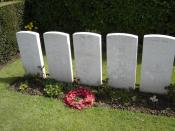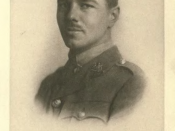One of the biggest misconceptions of all time is the glamorization of war. This holds true throughout history. Why do people believe that war is glorious, and why do people believe that war is so untouchable? Many people, who have never seen war, know only of stories told of heroic deeds and great valor. There are many reasons that we humans make war so unrealistic in our minds. Perhaps, we don't know what really happens, misled by other's accounts, or are we so afraid of what war might really be that we block our reality. Many poets have attempted to explain the horrors of war through their work. The main objective of these war poets is to display war in a realistic manner, so that it may be avoided. Many use irony, while some are straightforward. Either way, it is certain that these poets despise war, and they attempt to eliminate the glamorization of war that has so often been displayed throughout history.
The realistic war poets can be broken down into three groups. The first is the precursor group to the official "war poets."� The second is the actual "war poets"� of World War I, and the last is the World War II group.
One of the poets that first wrote about war in a realistic manner was Stephen Crane. Crane wrote a good deal about the civil war and its atrocities. In Crane's poem, "Do Not Weep Maiden, For War Is Kind,"� irony is the major device used. Crane states repeatedly that "War is kind,"� when it in fact is not. He starts off in convincing tone. "These men were born to drill and die / The unexplained glory flies above them"�(Crane 8-9). In this section of the poem, Crane attempts to give justification for war, even though...


